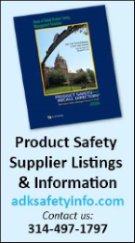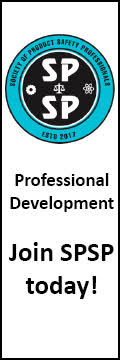CPSC: Record Enforcement Actions Against Chinese Manufacturers
May 27, 2025, Foley & Lardner LLP (National Law Review)
On May 15, 2025, the Consumer Product Safety Commission (CPSC) announced record enforcement actions against foreign violators. Many of these actions were taken “unilaterally,” meaning the Commission issued press releases warning consumers of potentially hazardous products without final approval from the products’ manufacturer or retailer. The CPSC announced 28 separate product safety recalls and warnings for products manufactured in China. This includes a “first-of-its-kind enforcement sweep of off-brand Chinese faucets found to leach lead and other contaminates into U.S. drinking water.”
Maryland Judge Denies Request To Allow Fired Federal Employees To Work During Pending Lawsuit
May 28, 2025, WJZ News
A Maryland judge denied a request that would have allowed three former Consumer Product Safety Commissioners to return to work while their case is litigated in court. Former President Joe Biden’s appointees Richard Trumka, Mary Boyle and Alexander Hoehn-Saric were informed of their removal earlier in May. The three former federal workers claim in a lawsuit that President Trump illegally fired them without cause. They sought a temporary restraining order and a preliminary injunction that would allow them to continue working, which was turned down.
Commissioner Douglas Dziak: Regarding CPSC Recall Of Adult Portable Bedrails
May 29, 2025, cpsc.gov
The Consumer Product Safety Commission (Commission) issued a record recall of almost 95,000 units of two models of adult portable bed rails (APBRs). These products violate the required safety standards. This recall is in addition to another recent APBR product safety warning. Commissioner Dziak has made decreasing hazards for seniors a priority.
The Power Of Mattering At Work
May-June, 2025, Harvard Business Review: The Magazine
Quiet quitting, the Great Resignation, chronically low engagement numbers and increasing numbers of labor disputes—business leaders have been warily watching these trends for years and fighting each fire separately. But the trends continue, because leaders are missing the underlying problem that connects these symptoms: Many employees don’t feel that they matter to their employers, bosses and colleagues. Mattering is the experience of feeling significant to those around us because we feel valued and know that we add value. In this article the author shows leaders how to apply this concept in the workplace.
E-Scooters: UK Public Sees Environmental/Affordability Benefits, Safety Fears Remain
May 28, 2025, Ipsos
A new study from Ipsos UK reveals that 61% of British adults believe e-scooters negatively impact pedestrian safety. However, around 2 in 5 see e-scooters as positive for the environment (39%) and cost of travel (40%). According to Ipsos, the research suggests a need for targeted interventions, such as improved infrastructure and stricter enforcement of traffic laws, to mitigate these risks and unlock the full potential of e-scooters as a sustainable mode of transport.
Product Recalls May Spike Amid Tariffs And Lighter Oversight
May 27, 2025, Insurance Journal
The US could see a spike in product recalls across key industries, including food, consumer goods, and automotive, as global supply chains shift under the pressure of tariffs and regulatory changes. The strain of tariffs could force many companies to source cheaper materials or shift to new suppliers, often without adequate time to vet these sources. In industries where safety and quality are paramount this can be risky, according to Chris Harvey, senior vice president of client services at Sedgwick.
PFAS Could Be Replaced With Safe Graphene Oxide Solution
May 28, 2025, Northwestern.edu
Northwestern University researchers have developed a new water- and oil-resistant material that could become a safe, viable replacement for harmful PFAS in food packaging. Derived from graphene oxide, the material is non-toxic, environmentally friendly and affordable. When applied to paper-based food and beverage packaging, the material not only provides exceptional barrier properties but also significantly enhances the product’s overall strength.
CPSC: Stop Using Aiho Dressers Due To Risk Of Serious Injury Or Death From Tip-Over/Entrapment Hazards; Violations Of The STURDY Act; No Recall Or Remedy Offered
May 29, 2025, cpsc.gov
The Consumer Product Safety Commission is warning consumers to immediately stop using Aiho dressers because they are unstable if they are not anchored to the wall, posing serious tip-over and entrapment hazards that can result in injuries or death to children. The dressers violate the performance and labeling requirements of the STURDY Act and CPSC’s implementing regulations. CPSC issued a Notice of Violation to the seller, Shenzhen Yiqun Technology Co. Ltd., dba Aiho Inc., of China. Aiho has not responded to CPSC’s repeated request to recall these dressers or offer a remedy to consumers.
Over 100,000 Kitchen Faucets Sold On Amazon Recalled Due To Harmful Levels Of Lead Exposure
May 29, 2025, CBS News
More than 100,000 kitchen faucets have been recalled because they could lead to dangerous levels of lead exposure according to the Consumer Product Safety Commission. Three different faucets models, manufactured in China and sold under the brands Vfauosit, Kicimpro and Basdehen, were determined unsafe after tests revealed they contain lead that could leak into the water supply and cause harm to young infants and children. Lead ingestion can “cause harmful neurological effects on infants and young children, including attention-related behavioral problems, decreased cognitive performance and lower IQ,” the CPSC says in the recall notices.
Fast-Fashion Brand Shein Increasing Safety After EU Warning
May 29, 2025, CTV News
Fast-fashion retailer Shein said it would increase its testing of products this year, after the European Union warned of fines if it does not address the bloc’s concerns about unsafe and dangerous products sold on its site. Shein said it targets 2.5 million product safety and quality tests in 2025, up from two million last year, and said it would spend US$15 million on compliance initiatives this year. The EU’s Consumer Protection Co-operation network of national consumer authorities and the European Commission notified Shein of practices that infringe EU consumer law, giving the company a month to reply.
Dallas City Council Approves Ambitious Bike Plan To Improve Safety, Access
May 28, 2025, CBS News
The Dallas City Council unanimously approved a sweeping bike plan aimed at making cycling safer and more accessible across the city. Rebekah Kornblum, an experienced cyclist and president of the Dallas Bicycle Coalition, said she feels comfortable biking in Dallas but knows that’s not the case for everyone. “For someone who is not as confident on a bike, or maybe they want to bike with their kids, I understand that they don’t feel safe,” she said.
State Attorney General Enforcement Under The CPSA
May 2025, cpsc.gov
The Consumer Product Safety Commission can work with State Attorneys General to protect the public from dangerous consumer products using Section 24 of the Consumer Product Safety Act (“CPSA”). State Attorneys General have the authority to enforce certain provisions of the Consumer Product Safety Act under Section 24 of the Consumer Product Safety Act, 15 U.S.C. § 2073. The CPSA requires written notice prior to taking action under Section 24.
An effective product safety management program can help to reduce accidents, reduce recalls, reduce insurance premiums, increase the safety and quality of products, provide a more defensible product and company in the event of litigation, and minimize the chance of punitive damages.
Read More






